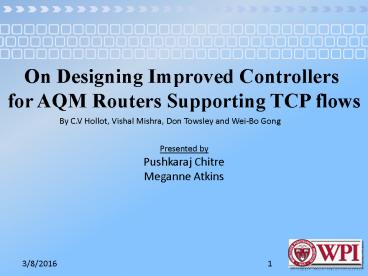On Designing Improved Controllers - PowerPoint PPT Presentation
Title:
On Designing Improved Controllers
Description:
AQM response time better then REDs. Proportional Integrator. Improves network performance ... AQM response time better then REDs. Able to handle and regulate ... – PowerPoint PPT presentation
Number of Views:15
Avg rating:3.0/5.0
Title: On Designing Improved Controllers
1
On Designing Improved Controllers for AQM
Routers Supporting TCP flows
By C.V Hollot, Vishal Mishra, Don Towsley and
Wei-Bo Gong
Presented by Pushkaraj Chitre Meganne Atkins
2
Outline
- Introduction
- Background
- The Proportional Controller
- Experiments
- Limitation
- PI Controller
- Experiments
- The Delay Utilization Trade-Off
- Conclusion and Future Work
3
Introduction
- Uses Classical Control System Techniques for
developing controllers. - Proposes 2 designs
- Proportional Controller
- Proportional Integrator Control
- Uses NS-2 Simulations
- Performed control theoretic analysis of RED
4
- 2 limitations of RED-
- Compromise speed for stability and vice versa
- Direct coupling between queue length and loss
probability
5
Background
- Linearized the TCP model
6
P(s)PTCP(s)PQueue(s)
R0 Round Trip Time at the operating point C
Link Capacity (packets/sec) N Load Factor (No of
Connections)
7
(No Transcript)
8
The Proportional Controller
- ?g0.1min(ptcp,pqueue)
- Lag in the low pass filter responsible for the
sluggishness of the RED controller - Not replacing the low pass filter by proportional
controller, the authors suggest designing of the
stabilizing controller.
9
- Design-
- K8
- ?g1.5 rad/sec
- Note the values are calculated in the Control
Theoretic analysis of RED
10
Experiments with propotional controller
- X-axis-gttime(sec)
- Y-axis-gtQueue Size(packets)
- Experiment 1-
- 60 FTP flows
- 180 http sessions
- Link bandwidth15Mb/s
- Added time-varying dynamics
- Buffer size800 packets
11
Comparison of RED and Proportional controller
Sluggish response Of RED
Settling time
12
- Experiment 2
- Repeat the previous experiment by doubling Round
Trip Times.
Overshoots on RED
13
Proportional controller with high gain
14
Limitations of Proportional Controller
- For stable operation, a relatively shallow slope
in the loss profile required. - Reason-coupling between queue size and marking
probability - Solution decouple by using integral control
- Steady state error
15
Solution to limitations
- Use of proportional Integrator Controller
- Steady state error0
- Can clamp queue size ro reference value qref
- Much higher loop bandwidthfaster response
16
The Proportional Integrator (PI) Controller
Higher loop bandwidth faster response time
17
Functional Form of the PI Controller
(s/z 1)
C(s) KPI
s
18
Digital Implementation
Difference Equation
Pseudo Code
19
Experiment Tools Parameters
- Used ns simulator
- Sampling frequency of 160 Hz
- PI coefficients
- a 1.822 (10) 5
- b 1.816(10) 5
- qref 200 packets
- Buffer 800 packets
20
Experiment 3
- Faster response time
- Regulation of output
- PI Controller insensitive to load level variations
21
Experiment 4
- Faster response time
22
Experiment 5
- PI controller settles at 10 milliseconds
- RED settles at 115 milliseconds
23
Experiment 6
- RED experiences oscillations
24
Experiment 7
- PI controller is still at acceptable performance
- Response time has slowed ( 40 milliseconds)
- RED and Proportional Controller hit the roof
AQM system (with finite buffer) needs integral
control
25
Experiment 8
- The RED controllers steady state error has
increase - due to
- - Shorter RTT
- - Operating Point Queue Length Higher
26
The Delay Utilization Tradeoff
- Large buffers lead to
- Higher utilization of the link
- Larger queueing delays
- In RED the delay is controlled by
- minth
- maxth
- pmax
- q0 in the PI Controller controls the delay
Larger values of q0 larger delays and
utilization
27
Delay Utilization Tradeoff
- For (nearly) full utilization
- Small q0 for FTP ONLY
- Large q0 for Mix (FTP/http)
Nearly linear relationship between q0 and delays
28
RED vs PI
- Delay in RED controlled by minth
- To dynamic ranges (maxth minth)used for RED
- Fig. 19 used 550
- Fig. 20 used 55
- Mixed flows were used
PI Controller capable of handling low delay and
high utilization
29
The Importance of ECN
- PI Controller can regulate the queue to a low
level - Lower Delay
- - less efficient performance
- Dropping packets leads to higher transmission
completion time
AQM used with ECN produces an almost lossless
system
30
Conclusions
- Two controllers
- Proportional
- Simple to implement
- AQM response time better then REDs
- Proportional Integrator
- Improves network performance
- AQM response time better then REDs
- Able to handle and regulate queue level
- Objectives
- Queue Usage
- Latency Reduction
- PI Controller out performed RED
31
Limitations and Future Work
- Limitations
- Used linear models
- Focused on classical control methods
- Did not look at global or optimal results
- Future Work
- More complex controllers
32
THANK YOU!

